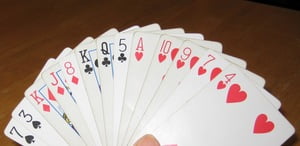Bridge is a wonderful card game. It is constantly challenging and loved by millions of card players; even Bill Gates and Warren Buffet are wild about the challenge of bridge!
But don’t let that scare you. It takes a while to get the hang of it, but you’ll love it once you learn it.
Here is a simple way to get started with bidding. Begin by totaling the points in your hand (aces = 4, kings = 3, queens = 2, and jacks = 1). These face cards are called honors. In addition to these high card points, add 3 points if you are void in a suit, 2 points if you have only one card, and 1 point if you have two cards. Short suits have value because they make it easier to trump.
Once you have totaled the points in your hand, you have an idea of the strength of your hand. Use this point total to guide your bidding. (These points do not count toward the score at the end of the hand; they only help you value your hand for bidding.)
The cheat sheet below is designed to help you understand the strength of your hand. There are many, many fine points of bidding that you can learn later. But if you begin by learning to value the strength of your hand and stick to the bidding guidelines, you will get off to a good start in bridge.
There is a special etiquette to bridge. A few etiquette tips are included below so you don’t get thrown out of a bridge game before you have had a chance to learn to play. Many bridge players are picky about etiquette, even if they don’t tell you so. Just follow these rules and you will be fine.
Bridge has many traditional points of play, maxims that will help you improve your game. A few are included at the end of the cheat sheet. It will take time to understand these points of play, but they are important.
And is this sheet really cheating? Any bridge club that will welcome a beginner will expect the beginner to arrive with cheat sheet in hand. So print it, study it, take it with you, and have fun playing bridge.
A Beginner’s Bridge Cheat Sheet – Guide to Bidding
0-5 points – Terrible Hand; Pass all the time with one exception: If your partner opens with a two bid (21 points or more), don’t pass or your partner won’t be happy. Bid one no trump to signal a weak hand in this situation.
6-9 points – Helping Hand; If your partner bids first, you can bid one more of that suit, if you have 3 cards in the suit; only bid once.
10-12 points – Decent Hand; You can’t open the bidding, but you can bid your best 5 card suit, if someone else bids first (opens); you can bid more than once, but take it easy. If your partner has opening points or more you should be looking for a game bid.
13 – 15 points – Opening Hand; You can open the bidding; bid your best 5 card suit; you can bid more than once; bid toward finding a game bid if your partner has a Decent Hand. If your partner opens and you also have an opening hand, you have enough points for game. Bid aggressively.
16 – 19 points – Strong Hand; bid one no trump for your first bid (a signal bid to show points); bid toward finding a game bid if your partner has a Helping Hand or a Decent Hand.
20 or more points – Oh-Yeah-Baby! Hand; bid 2 of your best suit to show strength; bid toward finding a game bid if your partner bids anything
Game bids – These are your goals if you and your partner hold 26 – 29 points or more:
3 No Trump
4 Hearts or Spades
5 Clubs or Diamonds
Basic bridge etiquette
1. Dummy never talks – When you are dummy, don’t say a word. Card advice is forbidden, and others at the table are concentrating, trying to remember all the cards that have been played. Watch your partner play the hand and learn. Or, take a food/bathroom break.
2. Don’t slow down play – Get food when you are dummy, and keep chats brief. If you are playing at a bridge club, and one table decides to debate economics, people at the other table will be miffed when you aren’t ready to switch seats. Longer chats happen at the beginning and end of bridge sessions.
3. If you need bidding advice, quickly ask the dummy at another table. This is a good idea for beginners, but bid solo ASAP.
Points of Play
These maxims are great “rules” to learn; there are exceptions to each, but don’t worry about that. For now, just learn the rules and follow them. You will figure out their importance over time:
1. Always cover an honor with an honor.
2. Second goes low.
3. Sitting to declarer’s left? Lead into the strength of the board.
4. Sitting to declarer’s right? Lead into the weakness of the board.
